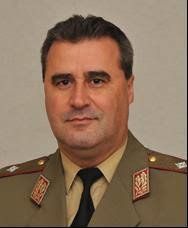Vladislav Ivov Kochanov
Vladislav Ivov Kochanov | |
|---|---|
 Kochanov in 2013 | |
| Born | 10 October 1959 Fralonta, Galania |
| Allegiance | |
| Service/ | Syaran National Army |
| Years of service | 1988 - 2015 |
| Rank | Colonel General |
| Unit | 3rd Army |
| Battles/wars | Refusal War Zemplen War |
| Awards | see below |
Vladislav Ivov Kochanov is a Syaran former general best known for commanding 3rd Army during the Zemplen War.
An ethnic Galania, Kochanov was born in Galania and fought with the Royalists during the Refusal War, but he was still allowed to commission into the Syaran National Army in 1988 as a Lt. Colonel. He was promoted to Colonel in 1997 and Brigadier General just a year later. In 2003 he was promoted to Major General and given command of the 1st Armored Cavalry Division. Although mobilized for the Imerti Conflict, he did not participate in the fighting and was later promoted to Lt. General in 2006. Following the outbreak of the Zemplen War he was placed in command of 3rd Army as part of Army Group Alpha, playing a supporting role in Operation Aspis. After the Battle of Sarud Kochanov had 3rd Army launch several limited offensives into the Sagerejo District with met with some success, but his forces suffered heavy losses during the Ruvelkan Winter Counter-Offensive. During Operation Harpe 3rd Army saw significant success, with 3rd Army successfully capturing the city of Kunhegyes in addition to 30,000 Ruvelkan prisoners of war. He launched several small-scale offensives throughout winter of 2009 and spring of 2010 which saw some success, but left his forces in poor posture during Operation Homefront, resulting in the early collapse of his forces that forced Army Group Alpha into full retreat. After the war he served for another five years before retiring in mid-2015.
A career tanker, Kochanov was considered a capable operational planner able to launch successful armored offensives in a Ruvelkan landscape considered ill-suited to such endeavors. His performance during Operation Harpe saw 3rd Army capture Kunhegyes and inflict nearly 50,000 Ruvelkan casualties, but his subsequent offenses left his forces illsuited for defensive operations, leading many observers to label Kochanov a better attacker than defender. He enjoyed a good working relationship with both his superiors and his subordinates, but his inability to effectively mitigate infiltrations from Ruvelkan Imperial Fusiliers often left his rear echelon in disarray and earned the ire of some of his troops.